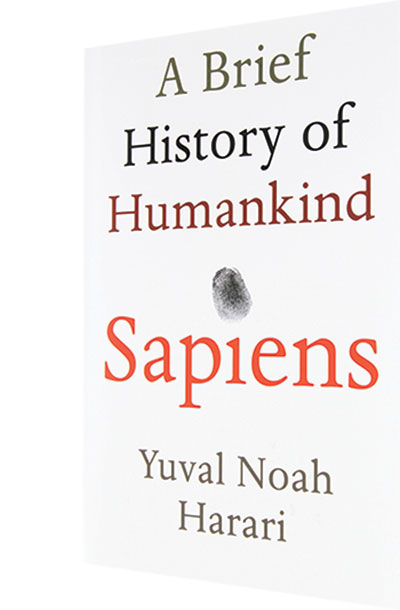Sapiens: a brief history of mankind, Yuval Noah Harari, Harvill Secker; Rs.210, Pages 433
 This is a truly extraordinary book — a comprehensive history of the origin and evolution of the human race. Inevitably, it hasn’t received the media and public attention it should have in this country where reading and knowledge are of peripheral interest. Yet Sapiens: A Brief History of Humankind lives up to its effusive book jacket encomiums (“thrilling and breathtaking”, “full of shocking and wondrous stories”, “starburst of a book”).
This is a truly extraordinary book — a comprehensive history of the origin and evolution of the human race. Inevitably, it hasn’t received the media and public attention it should have in this country where reading and knowledge are of peripheral interest. Yet Sapiens: A Brief History of Humankind lives up to its effusive book jacket encomiums (“thrilling and breathtaking”, “full of shocking and wondrous stories”, “starburst of a book”).
Although it’s the history of the origin of the species homo sapiens which over 2.5 million years since the genus homo first evolved on Planet Earth, and broke away to further evolve as homo sapiens 200,000 years ago and today dominates the world like a colossus, the redeeming feature of this biological and socio-economic history of human kind, is that Yuval Noah Harari, who teaches history at the Hebrew University of Jerusalem, has resisted the temptation to sing congratulatory praises of the wondrous ‘progress’ of humankind.
On the contrary, he expresses healthy contempt for the revolutionary achievements and all-conquering dominance of homo sapiens, and seldom misses an opportunity to remind the reader that deep down, this species driven by insatiable greed and self-interest has decimated thousands of life forms to extinction and may well be on the brink of self-destruction.
Indeed, perhaps the most valuable contribution to our understanding of the human condition — one of the imperatives of the newly emergent global community of homo sapiens connected 24X7 by the Internet, instant telecommunication and ease of jet travel — made by Harari is that we need to start thinking about global, rather than national, prosperity and survival. In his telling “timeline of history”, Harari reminds us that homo sapiens is a parvenu on the 4.5 billion- year-old Planet Earth, having evolved in East Africa only 200,000 years ago, and that humankind’s early cognitive capabilities became discernible a mere 70,000 years ago.
Moreover, he advances the theory that the 67,000 years our ancestors spent as itinerant bands of hunter-gatherers living in small mutually supportive communities before mankind’s discovery of agriculture 10,000 years ago, may have been the happiest years of the human race. Indeed, he describes the earth’s agriculture revolution, widely lauded as the beginning of civilisation, as “history’s biggest fraud” and the starting point of the descent of mankind.
According to Harari, invention of organised farming of wheat and goats which began in the hill regions of south-eastern Turkey, western Iran and the Levant a mere 10,000 years ago, opened a Pandora’s box for humankind. It prompted demarcation of properties for farming, the need for man-made laws to protect property rights which led to leaders of strongest bands of marauders becoming kings and emperors, who introduced systems of appropriation of portions of farmers’ produce as taxes to feed their soldiers.
The agriculture revolution also sparked a population explosion (more hands were needed to work farms) and the conquest of fertile neighbouring territories — later known as imperialism. In turn, the rise of imperialism and subjugation of new territories resulted in the establishment of huge empires, organised religion, and also catalysed the Industrial Revolution which the author reminds, began in Western Europe only 200 years ago. But it enabled Western nations to conquer the world, prompted the rise of global capitalism and invention of nuclear weapons which could wipe out homo sapiens and their 70,000 years’ history within few days.
Compelling evidence of lack of empathy that wandering, foraging bands of sapiens had — and continue to entertain — for other bands of sapiens and animal life forms is strewn throughout this 466-page tome of rich historical insights and interpretations explaining why sapiens have evolved into a greedy, self-centred race endowed with vast hubris, and well on the path of self-destruction. For start, sapiens first wiped out all other human species including the Neanderthals and homo florsciencis 30,000 and 13,000 years ago respectively. Simultaneously, sapiens extinguished the earth’s megafauna (major animal life forms weighing 50 kg or more) rising to the top of the food chain and “becoming the deadliest species in the annals of Planet Earth”.
The destructive power of homo sapiens was not restricted to mere animal life forms. Endowed with superior cognitive skills and higher powers of thinking and story-telling (“our languages evolved as a way of gossiping”) which enabled our ancestors to develop the myths of religion, culture and laws, the more aggressive bands of sapiens who ventured forth from their native habitats, used these socialisation myths to distinguish themselves from their fellow humans.
Thus Hernando Cortez and his conquistadores who invaded Mexico in 1519 had few compunctions about massacring the Aztecs, rationalising them as non-Christian heathens, to loot their abundant gold and reserves. Cognitive rationalisation, religion and unwarranted assumptions of cultural superiority underpinned the genocides of native American Indians in North America, the aborigines of Australia, the horrific cruelties of the slave trade, and Adolf Hitler’s cold-blooded attempt to exterminate European Jews.
The merit of this deeply researched and valuable history of humankind is that it provides an unembellished mirror to assess the human race, warts and all. The ugly reality is that notwithstanding our advances in the cognitive sciences, philosophy, arts, morality and ethics, beneath the veneer of civilisation, homo sapiens is essentially a greedy and violent life form, an animal driven by self-interest and capable of visiting and rationalising the worst and most painful cruelties on other life forms, including fellow human beings whom we can always distinguish as separate, distinct and unworthy of respect. And perhaps the most telling example of the extent to which homo sapiens is willing to go to satisfy his greed that Harari provides is of the newly-emerged ‘science’ of industrial farming which rationalises the most unimaginable cruelty visited upon the animals that our ancestors domesticated 10,000 years ago.
This book is an unvarnished history of the species homo sapiens which now dominates the world. But it is also a deeply disturbing book which explains man’s inhumanity to man and towards all other life forms on Planet Earth. It also explains why the human race has served its purpose, and is poised to self-destruct.
Dilip Thakore
Inherent development paradox
The broken ladder: the paradox & potential of india’s one-Billion, Anirudh Krishna, Penguin random house; Rs.416, Pages 599
 A boy struggles to complete high school and he is the first person in his village to do so. A year later, when he cannot find employment, he ends up digging for sand on a dry riverbed. A dairy farmer breaks her hip while milking a cow, and is forced to sell her silver anklets to pay for sub-standard but expensive medical care. These are some of the harrowing stories of India’s one-billion plus that we encounter in Anirudh Krishna’s book.
A boy struggles to complete high school and he is the first person in his village to do so. A year later, when he cannot find employment, he ends up digging for sand on a dry riverbed. A dairy farmer breaks her hip while milking a cow, and is forced to sell her silver anklets to pay for sub-standard but expensive medical care. These are some of the harrowing stories of India’s one-billion plus that we encounter in Anirudh Krishna’s book.
Our age is marked by two grand narratives: globalisation and democratisation — beacons of hope which are not readily compatible. While the move towards democracy requires a certain civic equality among all participants, globalisation in its present form accentuates social inequality. The Broken Ladder addresses the core issues of our democratic polity to underscore its fault lines. Our country represents paradoxes, juxtaposing an impressive growth record and some of the trendiest investment opportunities with a large number of poor, uneducated and undernourished people cut-off from the benefits and opportunities that accrue from globalisation.
Elites and the upwardly mobile in India see their futures linked more closely with a larger global project, and less intimately linked with vast numbers within their own country, the poor and the disempowered. Rising inequality emanating from decisions based on such attitudes has costs that keep accumulating. An important source of differences that persist between India and the advanced economies of the West is that a greater share of the Indian population lives in rural areas. The hinterland is frequently seen as a drag on India’s progress and modernisation.
There’s enough evidence of growing spatial inequalities, and a widening rift between cities and villages. One part of the explanation is what economists refer to as ‘agglomeration effects’. The other part has to do with attitudinal shifts and policy orientation.
Market-driven agglomeration effects explain why financiers, suppliers of intermediate goods and maintenance services, and a mass of young workers with diverse skills are typically attracted to vibrant locations with superior infrastructural facilities and growing economic opportunities, namely big cities. Specialised colleges, libraries and bookshops, industries and shopping malls crop up in clusters of big cities that are inhabited by highly skilled professionals and their families. As this dynamic gathers pace, the separation between urban and rural India widens.
This poses serious challenges to our democracy. Disaffection grows among the poor since national and international trade deals, as tools of globalisation, are viewed by them as working only to the advantage of the 10 percent, while imperilling the lives of the majority. Education reinforces these inequalities. During the colonial era, a small class of people — urban, middle class, English-speaking and college educated, “Indian in blood and colour, but English in tastes and opinions,” (to cite Macaulay’s infamous policy document) — came into being, amassing considerable cultural and intellectual resources and acquiring disproportionate economic weight and policy influence. This colonial era policy has not been reversed and the bias in education management has persisted well into the seventh decade of democratic rule.
The author examines the wasted potential of two-thirds of the Indian population that is effectively locked up in villages, lacking education, networks, and job opportunities. The belief that they can’t move up in society is well established but also self-reinforcing, and the author convincingly argues that India will never succeed without tapping into this vast reservoir of talent and promise. He notes that the problem cannot be fixed with macro-level policies, such as easing licensing requirements and courting foreign investment. The bottom-up policies that he suggests — building roads and schools (with motivated teachers), local control of school boards, village-level mentorship programmes, internships for village children in cities, more rural libraries, empowered field-level officials and new local institutions to hold them accountable and carry out effective social audits — are rooted in this development paradigm.
Krishna underlines the basic paradox of modernisation, that poverty is being created even as it is being reduced. How can policy interventions aimed at poverty alleviation take this into consideration? The central question in this book is about the ladder that leads out of poverty: why is it broken in so many places? How can it be fixed?
Though technology can provide transformative solutions to some pressing problems, it must be used with caution to avoid its centralising impact. Our policy makers may recall the talisman Gandhi once gave: “Recall the face of the poorest and the weakest man whom you may have seen, and ask yourself if the step you contemplate is going to be of any use to him.”
Satish C. Aikant (The Book Review, July 2018)























